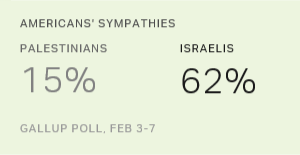Story Highlights
- Six in 10 continue to sympathize more with Israelis than Palestinians
- Republicans remain especially likely to favor the Israelis
- More in U.S. still favor than oppose establishment of Palestinian state
PRINCETON, N.J. -- Americans' views about the Israeli-Palestinian conflict remained steady over the past year, with 62% of Americans saying their sympathies lie more with the Israelis and 15% favoring the Palestinians. About one in four continue to be neutral, including 9% who sympathize with neither side, 3% who sympathize with both, and 11% expressing no opinion.
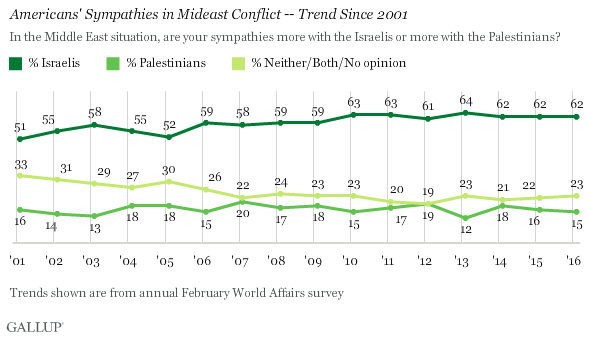
Americans have consistently shown more support for Israel than for the Palestinians over the past 15 years. However, sympathy for Israel increased in 2006 to 59%, from 52% the year before, in a Gallup poll conducted shortly after the January 2006 Palestinian elections in which Hamas -- which the U.S. government has classified as a terrorist group -- won the majority of parliamentary seats. Support for Israel has since remained at 58% or higher.
All major demographic and political subgroups of Americans lean toward Israel over the Palestinians on this question. However, several characteristics are related to the extent of public support for Israel.
Chief among these are religious preference and party identification. Gallup finds a 31-percentage-point difference in sympathy for Israel between Protestants (72%) and nonreligious Americans (41%), and a 26-point difference between Republicans (79%) and Democrats (53%). That contrasts with a 19-point difference between highly religious and nonreligious Americans, and an 18-point difference between older and younger Americans.
All of these differences from Gallup's Feb. 3-7, 2016, World Affairs poll are similar to the recent patterns in Americans' Mideast sympathies.
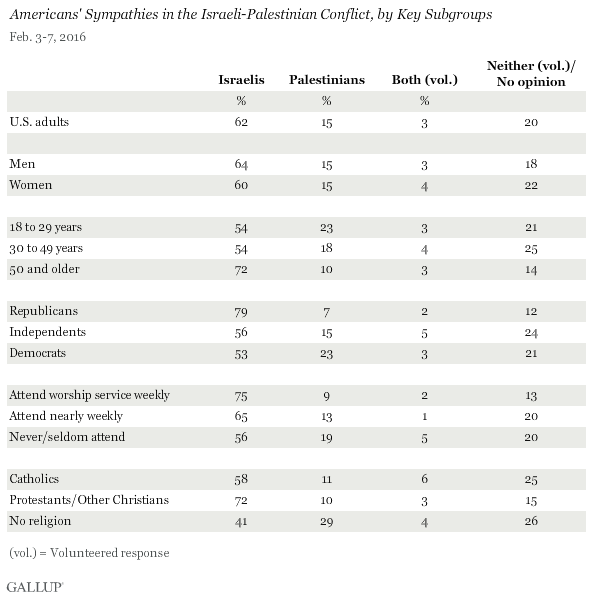
As Gallup has reported in the past, the partisan gap in Americans' support for Israel has widened over the past decade and a half as Republicans warmed toward Israel during George W. Bush's administration. This likely stems from the Bush administration's close relationship to that country as well as post-9/11 attitudes about terrorism and the Arab world. Meanwhile, Democrats' sympathies with Israel also grew during this period, just not as much.
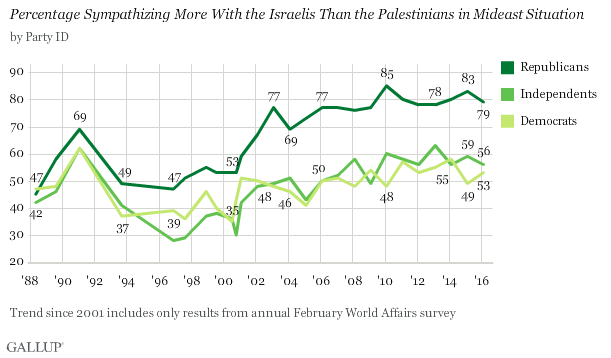
Separately, Gallup measures Americans' favorability toward Israel and the Palestinian Authority individually. The results are similar to the "sympathies" split, with 71% of Americans holding a very or mostly favorable view of Israel, versus 19% viewing the Palestinian Authority favorably.
These attitudes were also steady over the past year, though they show increased favorability toward Israel compared with 2000. At the same time, the trend shows no long-term change in favorability toward the Palestinian Authority. Apart from the occasional dip and spike, this has tended to be near 20%.
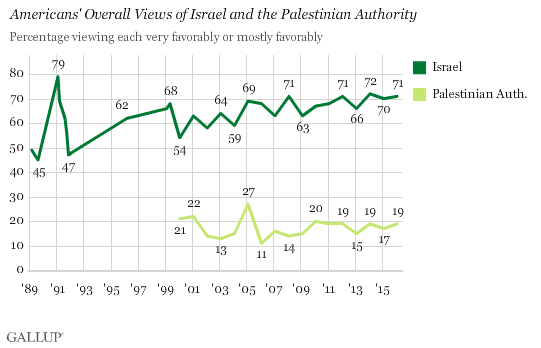
More Still Favor Than Oppose an Independent Palestinian State
One other trend question asked in the survey shows somewhat more U.S. understanding for the Palestinians. By a slight margin, 44% to 37%, more Americans favor than oppose the establishment of an independent Palestinian state on the West Bank and Gaza Strip. Those results are in line with what Gallup has measured since 2013; however, there were larger margins in favor of a Palestinian state in most prior years.
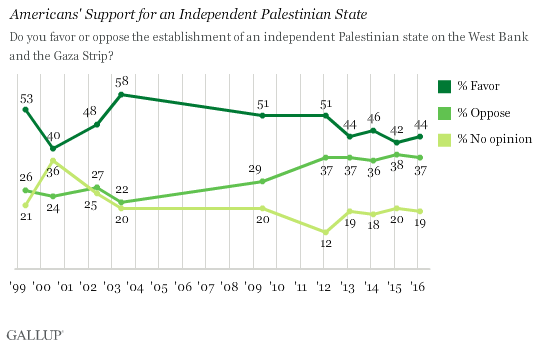
On this question, the two political parties have substantively different views, with 58% of Democrats supporting the establishment of a Palestinian state, compared with 26% of Republicans.
Bottom Line
Americans have become more sympathetic toward Israel over the past 15 years, and that more pro-Israel view held steady in the past year. While Republicans show extraordinarily high support for Israel -- an affinity evident at the Republican presidential debate in Houston last week, where every candidate professed his strong support for the Jewish state -- the majority of Democrats and independents are also on the same page.
Given this, it is intriguing that more Americans continue to favor than oppose the creation of a Palestinian state. The finding suggests that despite the lack of U.S. diplomatic activity on this issue in recent years, it is still something Americans would generally welcome should the next president be willing to work toward it.
Historical data are available in Gallup Analytics.
Survey Methods
Results for this Gallup poll are based on telephone interviews conducted Feb. 3-7, 2016, with a random sample of 1,021 adults, aged 18 and older, living in all 50 U.S. states and the District of Columbia. For results based on the total sample of national adults, the margin of sampling error is ±4 percentage points at the 95% confidence level. All reported margins of sampling error include computed design effects for weighting.
Each sample of national adults includes a minimum quota of 60% cellphone respondents and 40% landline respondents, with additional minimum quotas by time zone within region. Landline and cellular telephone numbers are selected using random-digit-dial methods.
View complete question responses and trends.
Learn more about how the Gallup Poll Social Series works.
